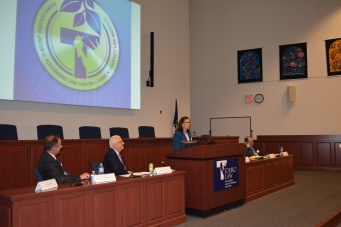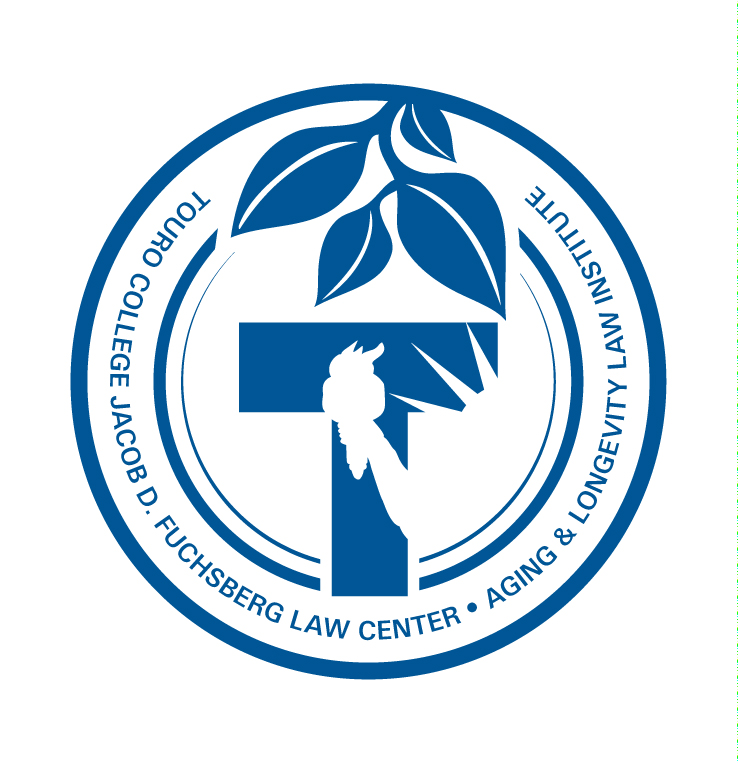On Friday, June 19th, 2015, an attentive audience gathered at the Touro College Jacob D. Fuchsberg Law Center for the launch of the Guardianship Quality Initiative (“GQI”). Over 100 individuals, including members of the judiciary, attended Friday’s program titled, “The Aging Process: What Guardianship Judges and Lawyers Need to Know About the Actual and Perceived Physical and Mental Consequences of Aging”.

Honorable A. Gail Prudenti, Chief Administrative Judge, New York State Unified Court System addresses the audience at the launch of the Guardianship Quality Initiative
Following Dean Patricia Salkin’s opening remarks, the Honorable A. Gail Prudenti, Chief Administrative Judge, New York State Unified Court System, offered a thoughtful and insightful take on the Aging Process and provided a wonderful start to the day’s events. Justice Prudenti highlighted the important role the legal system plays in promoting and protecting the rights of vulnerable older persons and offered insight into why judges and lawyers must be aware of the actual and perceived physical and mental consequences of aging.
Ellyn Kravitz, Esq., Partner at Abrams, Fensterman, Fensterman, Eisman, Formato Ferrara & Wolf, LLP, and Dr. Wilbert S. Aronow Professor of Medicine, Westchester Medical Center, New York Medical College addressed the Actual and Perceived Physical and Mental Consequences of Aging. Ellyn reviewed the aging process, including an overview of common chronic conditions and the impact these conditions can have on an individual’s ability to perform activities of daily living. Ellyn offered an interesting and at times very humorous commentary on how to assess “Quality of Life”.
Dr. Aronow discussed health risk factors with an emphasis on heart disease, the leading cause of death in the United States, and hypertension. In his presentation, Dr. Aronow emphasized how these chronic conditions can adversely impact an individual’s overall health and quality of life as well as result in other medical problems.
Sheila Shea, Esq., Director, Mental Hygiene Legal Services, Third Judicial Department, New York State joined Dr. William H. Frishman, Professor of Medicine, New York Medical College to discuss The Relevance and Consequences of Diminished Mental Capacity. Sheila provided a short statistical overview of the prevalence of diminished mental capacity and addressed the various formulations of capacity under New York Law. Sheila also distinguished dementia from mental illness and addressed the civil rights of individuals with diminished mental capacity. Dr. Frishman identified and discussed risk factors associated with diminished mental capacity.
Following lunch, Dr. Kenneth Cohen, Associate Professor, Touro College of Pharmacy and Robert Cannon, Esq., Coordinator, Aging and Longevity Law Institute, addressed The Positive and Negative Implications of the Significant Use of and Reliance on Prescription Medications and Over the Counter Drugs by Older Persons. Robert discussed provisions within Mental Hygiene Law Article 81 that require individuals in guardianship proceedings to consider medications taken by alleged incapacitated persons. Dr. Cohen outlined the types and number of medications older individuals commonly take and introduced the audience to important terms, including “geriatric pharmacotherapy” and “polypharmacy”. Dr. Cohen also discussed the effect drugs can have on physical and emotional health as well as medication management issues and adverse drug reactions.
In the final presentation, Judges and Lawyers Must Look Beyond a Person’s Age, Diagnosis and Appearance, three experienced and well-respected guardianship attorneys, Joan Robert, Esq., Fern Finkel, Esq., and Ira Salzman, Esq, addressed the audience.
Joan reviewed the applicability of Surrogate’s Court Procedure Act 17-A and Mental Hygiene Law Article 81.
Joan and Fern emphasized the importance of addressing the physical and/or mental limitations of alleged incapacitated persons and that all participants in a guardianship matter must dedicate the time and resources required to ensure the rights of individuals are protected and respected.
Ira addressed challenges lawyers and judges face when determining if and when medical information should be introduced directly or indirectly in Article 81 Guardianship matters. Ira concluded the day’s events with a summary of the important role medical and pharmacological information can play in guardianship proceedings and urged members of the audience to utilize the information that the medical professionals provided in practice.
A special thank you to all of our speakers for taking the time to participate in the event and for contributing their skill and expertise to this exciting and rewarding program. If you would like to view the comprehensive materials that accompanied Friday’s program, please click here.
For your review, please find below a link to our “Guardianship Quality Initiative Brochure”, which features an overview of the GQI, an outline of the online weekly CLE programs, an outline of the live CLE programs, GQI content, and information regarding the cost of and how to register for this unique initiative.
Please click here for access to the Guardianship Quality Initiative brochure.
Please click here to go directly to the Guardianship Quality Initiative Registration Page.
If you have questions or wish further information, please feel free to write to me at rcannon@tourolaw.edu or call me (631-761-7190).


